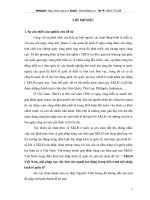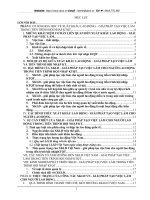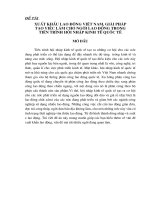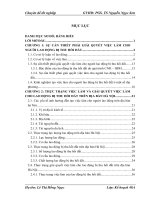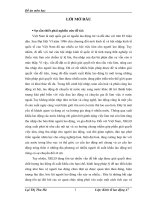Giải pháp tạo động lực cho người lao động tại hải quan hải PHònge
Bạn đang xem bản rút gọn của tài liệu. Xem và tải ngay bản đầy đủ của tài liệu tại đây (104.61 KB, 12 trang )
Individual Assignment – Organizational Behaviors
Introduction
Motivation is the desire and willingness of people to enhance their efforts to
achieve specific results. Thus, the driving force of motivation naturally comes from
each individual needs. With each individual with different positions, they are
promoted, and with different psychological characteristics, they will have different
desires and goals in their life targets. Because of these characteristics of
individuality, managers need to gain the key points to understand human motivation
and to apply different techniques on each management of human –being demands.
Motivating is understood as a system of policies, measures and management
techniques influenced directly on employees to make employees in the labor force
working motivation. To motivate employees are the responsibilities and objectives
of management experts. The most important keys used to be applied that showed
through efficient policies measures to exploit and promote efficient usages of the
potential resource of human in the operations. Whenever, employees are motivated
to work, they will create the ability to improve productivity and effectiveness in
working motivation. In addition, it is not only benefits gained but also creates the
organization cohesion and attracts good workers to organize.
To encourage employees, managers must promote the subordinates to release
their abilities to work with the best effort to carry out the organizational purposes,
in the use of motivational theories that administrators use to encourage and motivate
employees to work. The effectiveness of encouraging depends on the way and tools
of encouragement (physical and mental effects) that stimulates employees to use all
their maximum potentials and try to do the job. To gain the highest achievement and
expected results, the administrators must ensure that the workers are always
satisfied their individual needs as well as the general needs of the organization.
0
Individual Assignment – Organizational Behaviors
PART 1: THEORIES OF HUMAN MOTIVATION
There are many theories on motivation, each theory detailed each special
aspects and explored the different components of the impact factors. Managers must
be flexible in applying the theory and decide how to apply each theory to fit the
circumstances, the organization characteristics, to build an effective human resource
with management policies.
Specially, in my opinions, I choose two basic theories of motivation that I think
it useful and meet my personal favorites, are: Maslow, Pyramid of Needs &
Herzberg, Motivation – Hygiene theory
I. MASLOW, PYRAMID OF NEEDS
As my concerns, I learn that Pyramid of Needs of Abraham Maslow that
considered as the higher theory of recognizing human – being general living
demands. Untill now, Maslow theory still appears it outstanding aspects and
usefulness of management areas. According this theory, human needs showed as a
pyramid from low and basic to high and targeted. Theory showed that when the first
demands are met, human – being requires their next upgraded needs, “the demand
of each level needs to be met before people can move up to the next level”- quoting.
The pyramid is: physiological needs; safety; love and belonging; esteem and
respect; self – actualization
1- Physiological needs:
1
Individual Assignment – Organizational Behaviors
At the bottom of pyramid are the physiological needs, for example: food,
water, sleep, shelters; breaths; sex; garment. All these needs are almost supported by
purchases and finance, however, expenses understand as the tool of satisfactions not
targets. In these first requirements of Human need hierarchy, the human needs are
measured and predicted and even accounted by money, thus, managers stimulate
working stability, welfare, benefits as targets of working motivation to support
living conditions and purchases.
2- Safety:
Other scientists and Maslow studies about this field and considered that this is
an ordinary human need hierarchy and out of working motivation. However, in the
fact is opposite. People need to feel protected and personally safe (ex: from crimes);
they need to feel secure their job; and they need to feel financially safe. Any
workers who took part in their working life, they almost care about their working
meanings and characters, as well as working targeted benefits and working
confirmed terms of safe in finance and health care safety. Working safety aspects
reasoned working conditions, welfare, retirements and social security; working
stability and supported finances;
3- Love and belonging:
Beyond physiological and safety needs is the need for Love and Belonging.
This includes close friendship and a supportive family. Human also need to feel that
they belong to a group. It could be a club, a team, a religious group or a group at
work. When people need to be recognized in any group, they desire to live and
corporate in peace and corporations, and be called as a social needs of human –
being. Because of the strong belonging needs in organization, in each company,
there arrange Unions and non – manufacturing organization that ensure the needs of
employees, in which by the operating techniques and motivating terms to promote
work force. It is proven that, if the managers apply a suitable to raise the power of
team force of satisfactions that will strongly improve working effectiveness. And in
contrary, managers focus out of employee’s need and desire that easily form the
2
Individual Assignment – Organizational Behaviors
dissatisfaction within working force, which can make the worst damages to
organization. The positive and negative behaviors of employees depend much on
decisions and visions of administrators.
4- Esteem and respected needs:
When people are satisfied, they will move up to the next levels, in contrary,
they will feel very difficult to be motivated to do anything. Esteem and respected
needs is the fourth level of Maslow hierarchy, in which “people need respect and
they need to respect others” People also feel motivation from achieving things,
either in their personal and professional lives. In administration, esteem realed with
being respected by individual power, social positions and individual prestige.
Individual prestige seems a not viewable aspect that recognized by society. As a
physiological techniques, respect or being respect always take a roles of motivation
forward to the better position in life. In organization, each individual is respected
and motivated or not that affected directly to people behaviors. And it is clear that
each people always make targets and try to be respect in organization by power,
prestige and position.
5- Self – actualization needs
According to Maslow, this is the highest form of motivation. In this level,
people seem to be satisfied all fields and they can accept themselves and other
people as they are; and they may have a deep sense of right or wrong. Self –
actualized people often wish to solve problems of society. It is difficult to clearly
recognize and understand about this self – actualization. Explaining in organization,
this need recognized as the demands of self – professional and individual decisions
in working responsibilities. And furthermore, it is understood as the need of making
decisions and making effects to other people as well as society. In this case, people
will work to release their characters, capacity in creations and experience their lives.
In this system of needs, Maslow arranged needs in upgraded order from low to high
with their importance and roles, however, in the specific social conditions, this order
can be reversed. And the demands satisfied will be cause no longer work motivation.
3
Individual Assignment – Organizational Behaviors
Personal individuals and organizational individuals usually take actions to live
up their demands. Due to satisfactions of their needs encourage them to take action
and obey demands and keep going. On the other hands, the satisfied demands and
maximum satisfaction is the purpose of human action. Furthermore, understanding
these needs is the key to understand human motivation that the leader or manager
can control the behaviors of employees of using tools or measures to influence their
needs or expectations makes them aggressive and harder to assigned work, more
elated when performing tasks and more dedicated to the tasks they perform.
In a business or organization, basic needs can be met through the good and fair
wage paying; lunch or free mid-shift meals providing or ensuring other benefits
such as bonuses, welfares, annual bonuses, holidays, vocations,reward initiatives...
To meet the safety needs, managers can ensure favorable working conditions,
maintained stable and equal treatment of job security for employees. To satisfy the
demand social relationship, the employee should be facilitated group work, given
the opportunity to expand exchanges between departments, being encouraged to join
their ideas for the business development of organization operation. Also to meet the
growing demand relationship, business or organization should have team work
activities, entertainment or other holiday celebration. To satisfy demand of respect
for workers should be respected personality, qualities. Besides being paid adequate
wages or income on the relationship market, they also want respect for human
values. The managers or leaders, therefore, there should be no regulations and
policies praise, honors the successes and popularity of personal achievement results
widely. And workers should be provided timely feedback, promotion of personnel in
the new job levels and greater sphere of influence. For self-improvement needs,
managers or owners need to provide the opportunity to develop personal strengths.
At the same time, employees need training and development, should be encouraged
to participate in the process of innovation in enterprises or organizations and create
conditions for their own professional development.
4
Individual Assignment – Organizational Behaviors
Administrators will create motivated employees work better, help them secure
more work by the research and find out the specific needs of their employees and
take effective measures to meet, which means that they need to know to meet the
needs of employees are reasonable and intended. But it is important for
administrators to implement the motto "feeding hungry, thirsty to drink", that is to
find out if your employees are at the demand, which come up with new solutions
motivate rational and effective.
II. HERZBERG, MOTIVATION – HYGIENE THEORY
The American of management psychologist, Frederick Herzberg separated
motivating factors into several parts that is resulted from other factors, including the
elements that make up the satisfaction and dissatisfaction. Each factors itself
consists of both sides of the satisfaction and dissatisfaction and it depends on how it
is implemented, and it is met how to live up human needs to clearly recognize the
nature of the each factors. This theory is divided into two factors of work motivation
are: maintenance factors of external satisfactions and motivation factors - internal
satisfactions.
Maintenance factors: It is external environment of satisfactions of working
force, such as: working regulations; salary; working conditions that lead to
satisfactions.These factors, whelther they are well-organized to meet employee
efforts or they are not well-organized to be not satisfied with the work of the
employees.
Motivation factors: It is these factors that create satisfaction, such as:
recognizations, achievements, work it self, responsibility, advancement, growth,
responsibilities and functions of the labor progress. They are the basic needs of the
workers participating in work. These characteristics of motivation factors, if they are
not fulfilled, they can lead to dissatisfaction, and in contrary, if they are satisfied,
they will have the effect of motivating human working.
Herzberg makes a job enrichment program as a method of applying the theory
of his motivating factors. This program includes making the work of intensively
5
Individual Assignment – Organizational Behaviors
challenging by allowing employees to participate in a more positive and have more
autonomy in their work. This will give them the feeling of complete and more
satisfying.
III. 2 THEORIES, RELATED TO WORKING MOTIVATIONS
From analyzing the theoretical basises of 2 theories, we can find the
relationships between the two theories (Theory of Human Motivation of Maslow
and Dual factors theory of Herzberg). Relationship can be expressed by the
combination of needs and motivations that determine the human behaviors
Maslow pointed out in every human - being their needs in living and it is
divided into five levels from low to high. Herzberg stressed on two factors that
promote and maintain human working attitudes.
When people have already satisfied this element, they will rise higher demands
the previous levels. However, to satisfy the demand is still a big question. Their
needs and motivations associated with goals that they set will constitute their
behavior. So if in a enterprises, policies that ensure good employees will stimulate
workers to work. Their behavior will have a positive impact on the operation of
enterprises. On the other hand, if the regime's policy without discussion enterprises
meet the demands, workers will not be able to stimulate their enthusiasm to work.
PART 2: PACTS OF MOTIVATIONS IN WORK
Currently, I work at the Bureau of Hai Phong Customs, supplied useful
knowledge of Dr. Binh was meaningful to me, especially, combining them with the
practical work of the working motivation theory. I precie that there contain several
negative problems on working motivation, following:
- The working mechanism problems that lead a lot of employees do not have
the motivation in the work process, but working steps by steps, lack of commitment
and enthusiasm, out of targets and responsibility.
6
Individual Assignment – Organizational Behaviors
- A leader is very devoted to his job, he always interjects all the work of each
employee, however, it will lose coherence of the individual, passive and lacking
creativity, which damages the individuality.
- The link between the members of the company not really close, not really
create a strong collective solidarity, and weak team work.
- Each individual is not actually responsible for the work under their charge
settlements, being push, avoidance and fear of responsibility.
II. REASONS, ANALYSIS
- Under the state's current mechanism of State – owner Organizations, state
recruited employees will work 3 months of testing and then become the official
State Officers and be entitled to base salarywage coefficient; working full 8 hours,
getting salary stably. Thus, for state employees in general and especially those who
have no capacity to excel, not ambitious to uygrade their job, not violate labor laws,
rules and regulations of the agencies, units, does not bear the responsibility, do not
work hard,... but still not get fired or lose their jobs. It means that, every component,
living conditions are satisfied to maintain lives. Thus, the state offiers will have
chances to create themselves challenges, experience, and forward efforts and devote
capacity for work developing.
- The good experience senior leader of Organization who will devote to his
work hardly and not empower duty to each employee strategically, he will not
encrouge his staffs to motivate. Separating all the work to each individual or control
their work according by his way is a technique of management, which not only
reduce the productivities of work but also damage to employee life time of working,
specially, with a State –owner company. And staffs will loose their individuality
gruadually. They will not face challenge, not be self confident, not be motivated.
- Working under the management of such a leader and working under
mechanism of State – owner Organizations, employees lead to the intimate
connection between the members, almost no coordinationworking groups which are
according to the will of the leader. Do not have a clear division of duties and
enpowers specific to the individual should each individual dodge push for the hard
7
Individual Assignment – Organizational Behaviors
work and do not want to be responsible specifically for the part he had the
decision. ...
III.
RECOMMENDATIONS
STRATEGIES
FOR
WORKING
MOTIVATION IMPROVING
- Need to reform new mechanism of State – owner Organizations, of
recruitment and working mechanism. Building a more challenge working
environment to create the needs and desires of employees in life, to be motivated or
satisfied ...
- Managers and empower skills. Need a new vision and strategy about this.
Managers need to trust in the ability and qualifications of employees, giving them
the right to take the initiative in solving problems, they develop the ability and
creativity, listen and absorb their opinions in a selective wayto solve tasks in the
most effective quality.
- Newly layout of managers to ensure positive change to renew organization
gruadually. When employees believe, be in charge, to promote their qualifications,
they will feel valued and more engrossed with work, dedication to the job to prove
myself. Need to create activities to combine people together, promoting their
teamwork, mutual support when handling.
- At the same time, should also be specified to assign tasks and powers of each
individual in a specific, clearly to avoid the push to avoid when dealing with the
work and bear the responsibility of each individualthe implementation of the new
quality of work actually improved.
- When empowered individuals of responsibility, clear structure of
empowerment, take self staff responsibility system, need to build a supervisory
system tightly controlled to ensure the tasks performed, how complete, have the
right to request, the time limit set,
- Need to organize entertainment activities, organization entertainment,
tours, ... to combine people together, creating a collective bond of unity and mutual
love. Bonus mode, welfares, timely encouragement in many ways, as cited before
8
Individual Assignment – Organizational Behaviors
the meeting of the unit, per the title of reward, leadership planning, ... employees to
see the talents, see the results, try the constitutionality of how they have been
recorded from managers, business managers.
Conclusions
The management course of Organizationbehaviors by Dr. Tran Van Binh, I
myself found that subject has given me a new vision of a field knowledge, an
important issue for managers, leaders who need to understand, use management
practices to ensure that the agencies and units, their businesses flexibly apply the
basic theory of motivation for employees to create a comfortable working
environment, encourage, motivate, reward worthy, maximize productivity, quality,
work efficiency, the importance of teamwork, communication and communications,
create distinct corporate culture. The main things that will make up the image of the
leader as well as government agencies, and business units.
I believe that the subjects with the enthusiasm of Mr. Binh - a teacher researcher with experience teaching for many of the major universities, institutions,
major projects, the economic groups,... and with their own profound experiences
during teacher leadership position as Head manager of Faculty of Economics and
Management of the Hanoi Technology University, director of the Center for
Research and Consulting on Management University HUT with serious learning
during all class members international business Management PGSM. H02 will bring
precious knowledge, useful for application in management practices for each
member of the class, help agencies, units, organizations and growing a business
sustainable, growth contribute to the economic development of our country.
Once again, I highly appreciate to thank PGS. Dr. Tran Van Binh for his
lectures very practical, useful, with experience, deep practical experience of the
teacher.
Best Regards
9
Individual Assignment – Organizational Behaviors
Part
1.
MOTIVATIONAL THEORIES,
EFFECT
TO
HUMAN
RESOURCES WORKING MOTIVATIONS
1. .
Maslow's Theory of Hierarchy of Needs
1. Physiological needs
such as: eating, breathing, sleeping, resting, drinking water, shelter, and sex,
2. Safety and Security needs:
physical security, life safety and financial stability,
3. Love and Belongingness needs
to be loved, be loved, and belonged: families, clubs and organizations,
4. Self- Esteem needs:
respected, honor and trust
5. Self- Actualization needs:
to be able to influence to other people (social recognition, famous, power), well
recognized
"
10
Individual Assignment – Organizational Behaviors
2.
Herzberg Theory of Motivation – Hygiene Theory
Herzberg refers to two groups of factors that impact on the work of the People,
including: Group of Motivations and Group of Stabilities, as follows:
a.
Motivation factors
b.
Maintainance factors:
Part 2.
ORGANIZATIONAL BEHAVIORS
1.
Introduce about the Organization
Company Name: Consultancy on Contruction of Building Material Project JSC,
Conclusions
11

